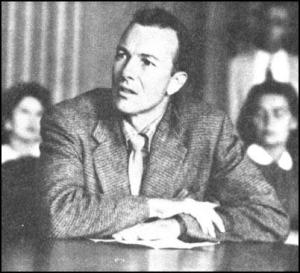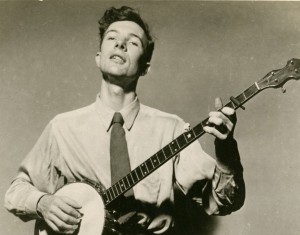I’m trying to find a video of Pete Seeger before the House Un-American Activities Committee in August 1955. I know I’ve watched it, but it’s not to be found. If you know its whereabouts, let me know.
1955. I know I’ve watched it, but it’s not to be found. If you know its whereabouts, let me know.
Pete died today. Ninety-four years and he never grew old. One of the last great American heroes, and if you’d like to argue with me on that I shall walk away. You win. You know who your heroes are, and God help you.
Excerpts from Pete’s hearing before the Committee follow. He was sentenced to 10 concurrent one-year prison terms (for contempt of court) but only served a few hours while his lawyer sorted out the bail. Years later the sentence was overturned.
Pete appealed not to the Fifth Amendment but—as he said in an interview later—to the First: freedom of religion, speech, press, and assembly. Much of the hearing can be summed up in this reply: “I am not going to answer any questions as to my association, my philosophical or religious beliefs or my political beliefs, or how I voted in any election, or any of these private affairs. I think these are very improper questions for any American to be asked, especially under such compulsion as this. I would be very glad to tell you my life if you want to hear of it.”
The hearing begins:
MR. TAVENNER: When and where were you born, Mr. Seeger?
MR. SEEGER: I was born in New York in 1919.
MR. TAVENNER: What is your profession or occupation?
MR. SEEGER: Well, I have worked at many things, and my main profession is a student of American folklore, and I make my living as a banjo picker—sort of damning, in some people’s opinion.
MR. TAVENNER: Has New York been your headquarters for a considerable period of time?
MR. SEEGER: No, I lived here only rarely until I left school, and after a year or two or a few years living here after World War II I got back to the country, where I always felt more at home.
Further on…
MR. TAVENNER: Mr. Seeger, prior to your entry in the service in 1942, were you engaged in the practice of your profession in the area of New York?
MR. SEEGER: It is hard to call it a profession. I kind of drifted into it and I never intended to be a musician, and I am glad I am one now, and it is a very honorable profession, but when I started out actually I wanted to be a newspaperman, and when I left school—
CHAIRMAN WALTER: Will you answer the question, please?
MR. SEEGER: I have to explain that it really wasn’t my profession, I picked up a little change in it.
CHAIRMAN WALTER: Did you practice your profession?
MR. SEEGER: I sang for people, yes, before World War II, and I also did as early as 1925.
MR. TAVENNER: And upon your return from the service in December of 1945, you continued in your profession?
MR. SEEGER: I continued singing, and I expect I always will.
MR. TAVENNER: The Committee has information obtained in part from the Daily Worker indicating that, over a period of time, especially since December of 1945, you took part in numerous entertainment features. I have before me a photostatic copy of the June 20, 1947, issue of the Daily Worker. In a column entitled “What’s On” appears this advertisement: “Tonight-Bronx, hear Peter Seeger and his guitar, at Allerton Section housewarming.” May I ask you whether or not the Allerton Section was a section of the Communist Party?
MR. SEEGER: Sir, I refuse to answer that question whether it was a quote from the New York Times or the Vegetarian Journal.
MR. TAVENNER: I don’t believe there is any more authoritative document in regard to the Communist Party than its official organ, the Daily Worker.
MR. SCHERER: He hasn’t answered the question, and he merely said he wouldn’t answer whether the article appeared in the New York Times or some other magazine. I ask you to direct the witness to answer the question.
CHAIRMAN WALTER: I direct you to answer.
MR. SEEGER: Sir, the whole line of questioning—
CHAIRMAN WALTER: You have only been asked one question, so far.
MR. SEEGER: I am not going to answer any questions as to my association, my philosophical or religious beliefs or my political beliefs, or how I voted in any election, or any of these private affairs. I think these are very improper questions for any American to be asked, especially under such compulsion as this. I would be very glad to tell you my life if you want to hear of it.
MR. TAVENNER: Has the witness declined to answer this specific question?
CHAIRMAN WALTER: He said that he is not going to answer any questions, any names or things.
MR. SCHERER: He was directed to answer the question.
The Committee got nowhere with him. They went in circles for a while, Pete saying, “My answer is the same as before, sir.” This follows:
MR. TAVENNER: I have before me a photostatic copy of the April 30, 1948, issue of the Daily Worker which carries under the same title of “What’s On,” an advertisement of a “May Day Rally: For Peace, Security and Democracy.” The advertisement states: “Are you in a fighting mood? Then attend the May Day rally.” Expert speakers are stated to be slated for the program, and then follows a statement, “Entertainment by Pete Seeger.” At the bottom appears this: “Auspices Essex County Communist Party,” and at the top, “Tonight, Newark, N.J.” Did you lend your talent to the Essex County Communist Party on the occasion indicated by this article from the Daily Worker?
MR. SEEGER: Mr. Walter, I believe I have already answered this question, and the same answer.
CHAIRMAN WALTER: The same answer. In other words, you mean that you decline to answer because of the reasons stated before?
MR. SEEGER: I gave my answer, sir.
CHAIRMAN WALTER: What is your answer?
MR. SEEGER: You see, sir, I feel—
CHAIRMAN WALTER: What is your answer?
MR. SEEGER: I will tell you what my answer is.
(Witness consulted with counsel [Paul L. Ross].)
I feel that in my whole life I have never done anything of any conspiratorial nature and I resent very much and very deeply the implication of being called before this Committee that in some way because my opinions may be different from yours, or yours, Mr. Willis, or yours, Mr. Scherer, that I am any less of an American than anybody else. I love my country very deeply, sir.
CHAIRMAN WALTER: Why don’t you make a little contribution toward preserving its institutions?
MR. SEEGER: I feel that my whole life is a contribution. That is why I would like to tell you about it.
CHAIRMAN WALTER: I don’t want to hear about it.
Pages of transcript later, the Committee tired of him and ended the hearing:
MR. TAVENNER: Was the booking agent of People’s Songs an organization known as People’s Artists?
MR. SEEGER: My answer is the same.
MR. TAVENNER: Will you tell the Committee, please, whether or not during the weekend of July 4, 1955, you were a member of the Communist Party?
MR. SEEGER: My answer is the same as before, sir.
MR. TAVENNER: Were you a member of the Communist Party at any time during the various entertainment features in which you were alleged to have engaged?
MR. SEEGER: My answer is the same.
MR. TAVENNER: Are you a member of the Communist Party now?
MR. SEEGER: My answer is the same.
MR. SCHERER: I ask for a direction on that question.
CHAIRMAN WALTER: I direct you to answer.
MR. SEEGER: My answer is the same as before.
MR. TAVENNER: I have no further questions, Mr. Chairman.
CHAIRMAN WALTER: The witness is excused.
____________________
[Source of text]:
____________________
[CBC interview in 1965 about the trial]:
_____________________
And, in one of the most patriotic songs (or least—you choose), written by Woody Guthrie:





